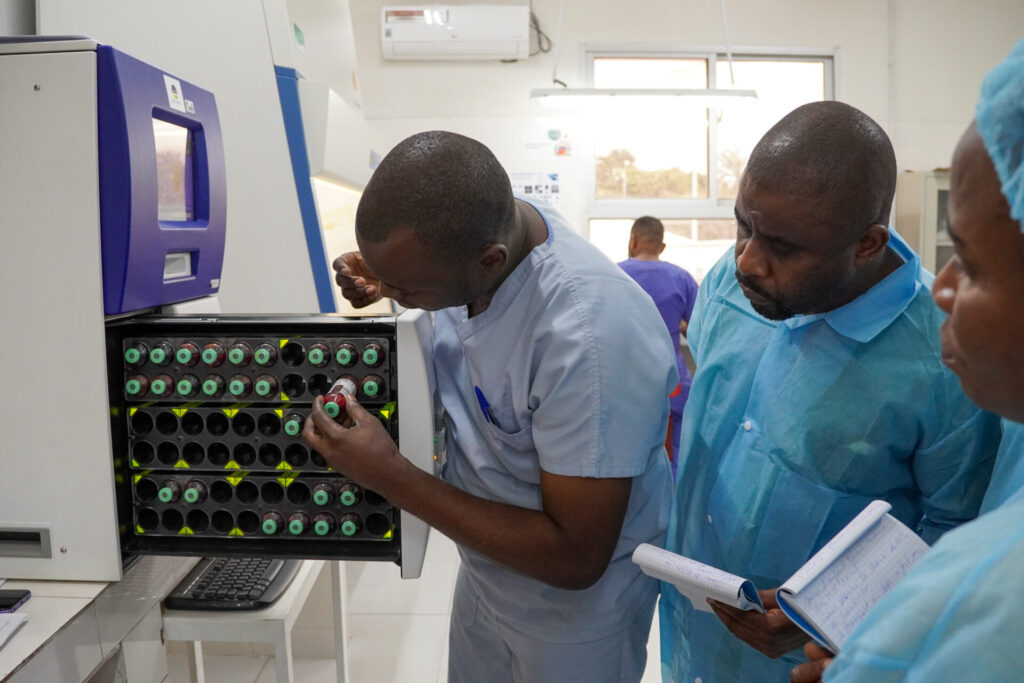In the ongoing fight against antimicrobial resistance (AMR), Infection Prevention and Control (IPC) supervisors and Antimicrobial Stewardship (AMS) focal points play a crucial role in ensuring best practices in MSF-supported healthcare facilities. To strengthen their skills, the MSF Academy for Healthcare implements the Antimicrobial Resistance Learning Programme, a mostly online training that equips participants with essential knowledge and skills. However, recognizing the limitations of distance learning to conduct certain activities, the programme organised a one-week, in-person workshop designed to deepen practical understanding, facilitate the transfer of learning into practice, and foster peer learning and exchanges.

In November and December, nine IPC supervisors and 11 AMS focal points from all Operational Centres, all active learners or graduates of the programme, gathered in Kinshasa, Democratic Republic of the Congo (DRC), and Homa Bay, Kenya, for a workshop facilitated by mentors from the MSF Academy for Healthcare’s AMR Learning Programme. Following a successful pilot last year in the Central African Republic, the workshops focused on practical applications of AMR strategies in real-world hospital settings, allowing participants to improve their observational skills, practice key techniques and exchange experiences with peers who face similar challenges. For many of these participants this workshop is a rare opportunity to spend time with other MSF staff who share the same role as them.

During the workshop, participants had the opportunity to engage in a range of practical learning activities to develop and strengthen specific competencies:
- Conducting audits and providing constructive feedback.
- Getting a deeper understanding on how to manage IPC and AMS committees.
- Responding to nosocomial infection outbreaks through simulations.
- Facilitating training for healthcare professionals.
- Observing and analysing hospital ward rounds.
- Visiting microbiology laboratories to understand the process of culture and antibiogram testing.
- Conducting Point Prevalence Surveys and analysing the collected data to identify gaps in antimicrobial prescribing.
- Practicing problem prioritization and developing action plans.
Topics such as resistance patterns, sample contamination rates, and strategies to overcome resistance to change were discussed. The interactive format, including group discussions, simulation exercises and pedagogical games -such as DAWAA game, a collaborative board game on the use of antibiotics- reinforced the collaboration between the two profiles and strengthened participants’ confidence to implement their learning in their respective projects.
At the end of this workshop, I feel equipped to carry out my activities and meet the IPC challenges that we face on a daily basis in the execution of our duties, with the objective to bring the answer to AMR by improving security and quality of care to the patients, staff and communities
Christophe Musombwa, IPC supervisor in Salamabila, DRC

A key highlight was the visit to microbiology laboratories, where participants observed first-hand the process of sample analysis, including Gram staining and culture techniques. This hands-on experience significantly enriched their understanding and reinforced the importance of microbiology in AMR management at MSF hospitals.
Exchanging experiences and building a network
Beyond technical knowledge, the workshops emphasized networking and peer-to-peer learning. Many participants highlighted the value of meeting colleagues from different MSF projects who have the same role, exchanging challenges and solutions, and building a professional network that can serve as support from now on.

The workshop successfully met its objectives, equipping IPC supervisors and AMS focal points with important skills to implement AMR initiatives in their healthcare facilities. By reinforcing practical knowledge, fostering collaboration, and building a network, this hands-on training ensures that MSF teams are better prepared to tackle AMR challenges effectively. As one participant noted, “this workshop was an eye-opener; it gave us the confidence and skills we need to make a real impact in our projects.”
